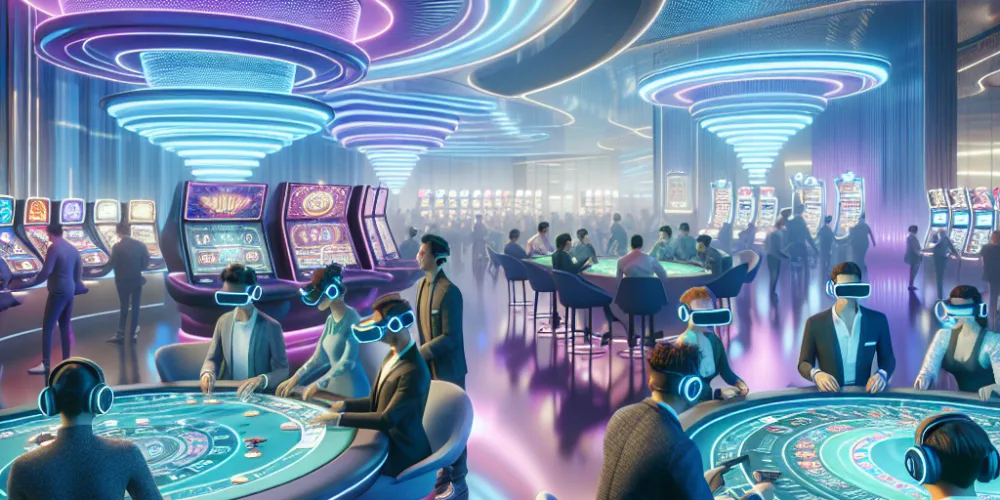In the constantly evolving world of gaming, the intersection of virtual reality (VR) and casinos has opened an exhilarating new chapter. As technology advances, VR casinos are not only becoming a viable option but are setting the stage for a revolution in how we experience gambling and interactive gaming. This shift is reshaping the landscape of the industry, merging the thrill of traditional gambling with the cutting-edge innovations of virtual reality.
Virtual reality technology uses VR headsets to immerse users in a digital environment that is astonishingly realistic. In the context of virtual casinos, this technology allows players to enter a full-scale, interactive casino floor from the comfort of their homes. Players can walk around, choose different games, interact with other players, and even pick up cards or pull slot machine levers, all within a virtual space.
The rise of VR casinos can be attributed to several factors, but accessibility and user experience are at the forefront. With major tech companies continually refining VR headsets, the technology is becoming more accessible to everyday consumers. Headsets like the Oculus Rift, HTC Vive, and Sony PlayStation VR are making virtual reality a household term.
One of the most significant advantages of VR casinos is the enhancement of player engagement and retention. The immersive nature of virtual reality provides a new level of excitement and interaction that traditional online casinos can’t match. Players are not just clicking a mouse but actually engaging in the casino environment. This immersion can lead to longer play sessions and a deeper connection to the gaming experience.
The social aspect of gambling, a key component in traditional casinos, is also effectively replicated in VR settings. Players can interact with each other in real-time, share tips, celebrate wins, or commiserate over losses. This social interaction component is crucial as it replicates the live casino experience, making VR casinos particularly appealing to those who seek the social atmosphere of gambling halls but may be geographically isolated or prefer the convenience of home gaming.
From a business perspective, VR casinos offer significant opportunities. Casino operators can expand their reach beyond the physical limits of their gaming floors. Without the need for physical space, virtual casinos can offer an unlimited variety of games and themed environments that can be changed or updated with much less overhead than their physical counterparts. Furthermore, VR casinos gather detailed data on player behavior, which can be used to tailor gaming experiences, improve customer satisfaction, and increase business intelligence.
However, the development of VR casinos also poses unique challenges. Regulatory issues are at the forefront, as the legal framework for virtual gambling is still developing. Jurisdictions that permit online gambling are now grappling with how VR fits into existing legal structures. Privacy and security are also paramount, as the immersive nature of VR necessitates the collection of more personal data, increasing the responsibility on operators to protect their customers.
Technologically, there are barriers to overcome as well. High-quality VR experiences require powerful hardware and fast internet connections. Although the cost of VR equipment has decreased over the years, the price and system requirements still pose a barrier to entry for some potential users.
Despite these challenges, the future of VR casinos looks bright. As technology advances and becomes more affordable, the barriers to entry will decrease, making VR gambling a more inclusive experience. In the coming years, we can expect to see more sophisticated games, improved user interfaces, and even more immersive VR experiences.
In conclusion, virtual reality casinos are carving a niche that could soon become a central feature of the gambling industry. They offer a compelling blend of realism, accessibility, and the thrilling atmosphere of a casino, all wrapped up in the cutting-edge technology of virtual reality. As they continue to evolve, VR casinos are set to transform the gambling landscape, offering a new world of possibilities for players and business operators alike.

Karine Gomez is an enthusiastic writer and avid gamer with a particular love for PlayStation and casino gaming. Her deep knowledge of gaming trends and casino dynamics makes her articles both informative and engaging. Karine’s passion for PlayStation games and her firsthand experience with casino play shine through in her writing, offering readers authentic insights and valuable tips.

